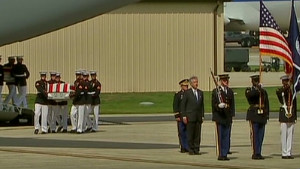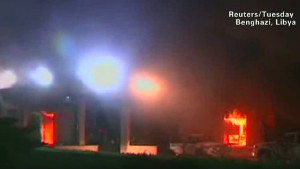 The remains of U.S. Ambassador to Libya J. Christopher Stevens and
three other Americans landed on U.S. soil Friday afternoon in
flag-draped caskets.
The remains of U.S. Ambassador to Libya J. Christopher Stevens and
three other Americans landed on U.S. soil Friday afternoon in
flag-draped caskets.
The four men were killed in an attack this week on the U.S. Consulate in Benghazi.
Teams of seven Marines
carried the caskets off a C-17 plane at Joint Base Andrews in Maryland
in a ceremony attended by a color guard and a chaplain, Army Col. Wesley
Smith.
President Barack Obama
and Secretary
Hillary Clinton gave remarks at the solemn transfer of
remains in an airport hangar, where four hearses with rear doors open
waited for the caskets. Families of the victims and dignitaries were
seated facing the hearses and a lectern.
"There's no doubt these
are difficult days," said Obama. But he pledged that "the United States
of America will never retreat from the world."
"Four Americans, four
patriots, they loved their country and chose to serve it and serve it
well," the president continued. "They had a mission and they believed in
it, and they knew the danger and they accepted it. They didn't simply
embrace the American ideal, they lived it, they embodied it: the
courage, the hope and, yes, the idealism."We will bring to justice those who took them from us," Obama said.
Clinton said that Libya,
Egypt and Tunisia "did not trade the tyranny of a dictator for the
tyranny of a mob." Those countries' leaders "need to do everything they
can to restore security" in the face of anti-American protests arising
from an "awful Internet video," she said.
Clinton said the four
victims' lives -- as well as all people who work in the Foreign Service
-- "are at the heart of what makes America great and good."
"America must keep
leading the world. We owe it to the these four men to continue the long,
hard work of diplomacy," Clinton said. "We will wipe our tears and
stiffen our spines and face the future undaunted."
Defense Secretary Leon Panetta and Vice President Joe Biden also attended the ceremony.
The other men killed in
Libya include Tyrone Woods and Glen Doherty, both former Navy SEAL
commandos working as diplomatic security officers. The fourth was Sean
Smith, an information management officer who also had an online
alter-ego legendary in the gaming world.
Four people have been arrested in connection with the attack that left Stevens and the three other Americans dead, the top aide to the president of the Libyan parliament said Friday.
Those arrested were not
directly tied to the attack, Monem Elyasser, the chief aide to Prime
Minister Mustafa Abushagur, told CNN by telephone.
Elyasser did not release the identities of the four suspects in custody, nor did he detail the allegations against them.
The announcement came as
the United States is struggling to determine whether a militant group
planned the attack that killed the four Americans.
The head of Libya's
ruling General National Congress, Mohammed Al-Megaryef, also confirmed
the four arrests but declined to say to what group the suspects are
linked.
However, the government
now believes the suspects are part of one of the many armed extremist
groups operating especially in the eastern part of the country and
Benghazi itself, he told CNN.
Authorities also believe
the attack was planned and deliberately carried out to inflict maximum
damage on key Western interests, particularly the United States, he
said.
The government believes the attack was intended to drive a wedge between Americans and Libyans.
Asked what the Libyan
government was doing to ensure security, al-Megaryef answered, "We are
doing our best to avoid further attacks." But he acknowledged that
authorities had little capacity to defend against the powerful extremist
groups.
State Department Under
Secretary Patrick Kennedy has said that the attack appeared to be
planned because it was so extensive and because of the "proliferation"
of small and medium weapons at the scene. He was briefing congressional
staffers when he offered that theory.
But on Thursday, three U.S. officials told CNN that they had seen no evidence the attack was premeditated.
A team of FBI
investigators is expected to be in Libya by Saturday, a source with
knowledge of the investigation told CNN. Agents are first conducting
interviews outside the country to gather information about the attack,
the source said.
Obama vowed Thursday that those responsible for the attack would be brought to justice.
"I want people around
the world to hear me. To those that would do us harm -- no act of terror
will go unpunished. It will not dim the light of the values that we
proudly present to the rest of the world. No act of violence shakes the
resolve of the United States of America."
During an interview on CNNI's "Amanpour," Abushagur said Thursday that there had been one arrest early Thursday in Benghazi and that three or four others were being pursued.
"The evidence itself is
based on mostly pictures that were taken around the compound at that
time, and also through some witnesses," the prime minister said.
Conflicting theories flew in the hours after the four Americans were killed late Tuesday.
They died amid a protest
outside the U.S. Consulate over a film that ridiculed Muslims and
depicted the Prophet Mohammed as a child molester, womanizer and
ruthless killer.
The demonstration was one of several protests across the region that day.
Protest as diversion
U.S. officials believe the attackers used the protest as a diversion.
Given what officials
know about al Qaeda in Libya, intelligence officials believe it is very
unlikely that core al Qaeda was behind the attack, a U.S. intelligence
official told CNN on condition of anonymity. The official was not
authorized to release the information.
Meanwhile, Shawn Turner,
director of communications for U.S. National Intelligence, denied news
reports that American officials had been warned of a possible attack.
"This is absolutely
wrong," he said. "We are not aware of any actionable intelligence
indicating that an attack on the U.S. post in Benghazi was planned or
imminent."
The United States is deploying warships and surveillance drones in
its hunt for the killers of the diplomatic staffers, and a contingent
of 50 Marines has arrived to boost the security of Americans in the
country.
The United States and
Libya have embarked on a new relationship since rebels toppled longtime
dictator Moammar Gadhafi last year.
U.S. and NATO warplanes
helped the Benghazi-based rebellion against Gadhafi, who was wanted by
the International Criminal Court for charges of crimes against humanity
before he was killed in October.
The jihadists suspected
in Tuesday night's attack "are a very small minority" who are taking
advantage of a fledgling democracy, said Ali Suleiman Aujali, the Libyan
ambassador to the United States.
Sources tracking
militant Islamist groups in eastern Libya say a pro-al Qaeda group
responsible for a previous armed assault on the Benghazi consulate is
the chief suspect. A senior defense official told CNN the drones will be
part of "a stepped-up, more focused search" for a particular insurgent
cell that may be behind the killings.
Rights groups have
raised concerns about the Libyan legal system, which is in the early
days of being rebuilt following the fall of the Gadhafi regime.
"Due process violations
against detainees in Libya are the norm," Human Rights Watch said in a
June report. "Libyan government officials told Human Rights Watch that
very few detainees have been formally charged and that very few of the
cases have been reviewed by a judicial authority."
At the same time, the
dominance of militia groups, "which in most towns and cities are
stronger than the army and police, has complicated the rebuilding of
Libya's justice system," the report says.
Amnesty International
has similarly warned of serious problems with Libya's legal system. Its
researchers also "found that hundreds of armed militias are acting above
the law."
Questions swirl around the attack
There are numerous
questions about what happened at the consulate where protesters had
gathered to demonstrate against the film "Innocence of Muslims," which
reportedly was made in California by a filmmaker whose identity is
unclear.
Chief among the questions is what happened to Stevens, who went missing during the attack.
What is known is that
during the attack, a rocket-propelled grenade set the consulate on fire,
and American and Libyan security personnel tried to fight the attackers
and the fire.
As the fire spread,
three people -- Stevens, Foreign Service information management officer
Smith, and a U.S. regional security officer -- were inside a safe room,
said senior State Department officials, who spoke on condition of
anonymity as a matter of practice during a briefing with reporters.
Smith was later found dead, apparently of smoke inhalation, officials said.
The State Department has
not released details about how Stevens died, though numerous media
reports have said the ambassador was taken from the consulate to the
Benghazi Medical Center by locals.
He arrived at the hospital, according to the reports, unresponsive and covered in soot from the fire.
A doctor was unable to revive him and declared him dead, the reports said.
Stevens' body was turned over to consulate personnel as they were evacuated from Benghazi.
As of Friday night, funeral plans had not been announced for the four Americans.
CNN


No comments:
Post a Comment